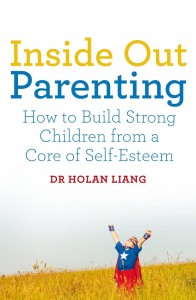This blog is a bit different from our usual pieces. It is a review of a new book called “Inside out parenting; how to build strong children from a core of self-esteem”. It is written by a colleague of ours Dr Holan Liang, who after motherhood turned her skills as a mental health professional to thinking about parenting. Two of us read the book, one a mother of three (Thalia), and one a 20-something with no children (Yasmin). Here is what we made of it!
I (Thalia) first met Holan about 15 years ago, when she came to talk to me about her interest in depression, and evaluating the interplay between biological and social factors. We worked on two papers together, with her taking an increasing lead as time went on and it was an absolute pleasure from start to finish. So, that is by way of my “conflict of interest” statement, I already knew Holan was smart, wrote well, and had interesting ideas before I even heard about her book. The book begins with an anecdote about one of Holan’s own parenting nightmare moments, in which her daughter and she have a stand-off over the putting on of some new shoes for nursery. It ends with Holan picking her daughter up and carrying her up the road, not at all pleased! This anecdote is a great starting point for the book in lots of ways. It shows how Holan, like the rest of us, has moments where life as a parent goes upside down. But later on she also uses it to show how by listening to our children, working out what matters to and bothers them we can sometimes prevent these flare-ups, and can also help them learn to cope with the difficulties life throws at us.
The book begins with an anecdote about one of Holan’s own parenting nightmare moments, in which her daughter and she have a stand-off over the putting on of some new shoes for nursery. It ends with Holan picking her daughter up and carrying her up the road, not at all pleased! This anecdote is a great starting point for the book in lots of ways. It shows how Holan, like the rest of us, has moments where life as a parent goes upside down. But later on she also uses it to show how by listening to our children, working out what matters to and bothers them we can sometimes prevent these flare-ups, and can also help them learn to cope with the difficulties life throws at us.
“without robust self-esteem, a child can do as well as they like in their schoolwork or hobbies, but they still won’t be happy”
The premise of the book is that whatever your child’s potential (much of which is influenced by what they inherit), will be best realised by spending their early years building their self-esteem. She proposes that without robust self-esteem, a child can do as well as they like in their schoolwork or hobbies, but they still won’t be happy. I find this a powerful message in today’s era of “tiger” parenting.

The term “tiger mother” was coined by Yale law professor Amy Chua. It refers to a strict or demanding mother who pushes her children to achieve academic success.
The first section of the book covers the “fixed core” (genetics, including straightforward explanations of the main findings and latest methods) and the “malleable core” (self-esteem). She moves through three key areas of development that create the “foundation” of any individual: social skills, dealing with emotions, and self-control. What is particularly nice about this section is that it combines her own experience as a mental health professional with her experience as a mum, to provide lots of help and practical tips that are grounded in the latest research and practice.
“What is particularly nice about this section is that it combines her own experience as a mental health professional with her experience as a mum”
The second half of the book discusses the “outer layers” of child development – relating to intelligence, creativity, conscience and identity. Holan shares some of the ways in which she has tried (not always successfully!) to foster these layers of development in her own children, while continuing to emphasise that the success of each outer layer relies upon the child’s strong foundation of self-esteem. I (Yasmin) especially enjoyed Holan’s honest and entertaining accounts of her own experiences as a parent – which included her attempts to persuade her despairing daughter to opt for a pirate or doctors costume, not princess, for fancy-dress at school.
A strong message in this section is the importance of helping your child to develop “mastery” in any given skill, subject, or hobby. It was interesting for me to read how Holan challenges some of the negative connotations that are often associated with “tiger” parents. Holan offers some practical tips on how to strike the right balance with your children. She argues that an initial push in the right direction from parents can help children to become good at things, which they can then go on to enjoy doing on their own. In this way, children are able to learn that hard work and perseverance can pay off – again helping to preserve their self-esteem and belief in their own ability.
Holan finishes with a section about the importance of challenging gender biases and striving for gender-neutral parenting. For fathers and mothers to play an equal role in child rearing – I would implore both mothers AND fathers to read this book!



